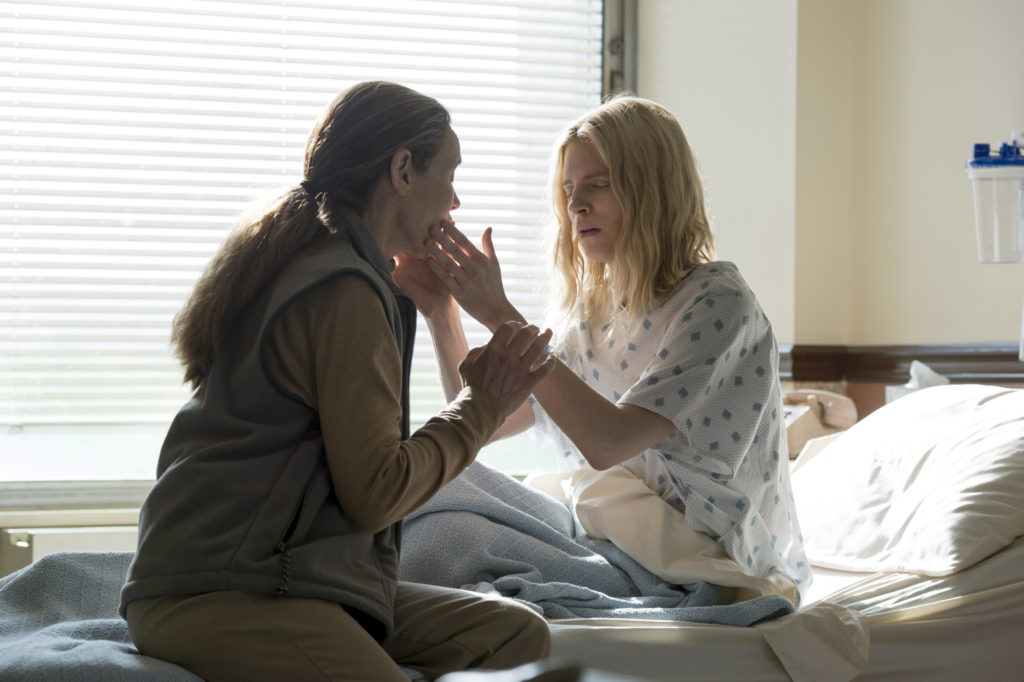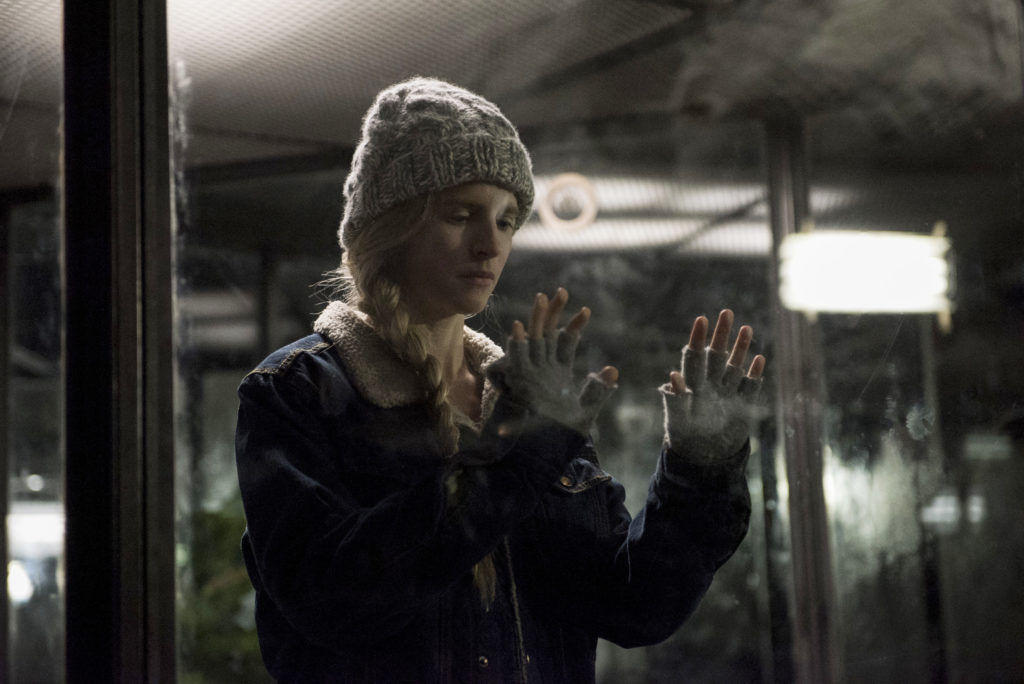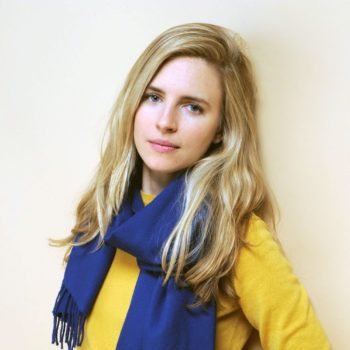Brit Marling first attracted some attention when two movies she co-wrote and starred in premiered at Sundance in the same year. Those films, “Sound of My Voice” and “Another Earth,” were widely acclaimed by critics and they both explored metaphysical themes. We talked with her about “Another Earth” back in 2011.
In her latest project, the Netflix drama “The OA,” Brit plays Prairie, a blind woman who goes missing for years, then reappears with her sight restored, harboring secrets. The multilayered story also involves a mad scientist and near-death experiences.
Brit co-wrote the show with her writing partner, Zal Batmanglij. He also directs it. The two met in college, and when Brendan met with her, he asked Brit why they didn’t just do something easy… like make a show about their lives.

Brit Marling: It’s funny that you should bring that up. The idea of telling a story of just like, “Two people who meet at Georgetown and come out west and try to figure out how to become storytellers.” ‘Cause Zal’s mom is often like, “Why don’t you guys tell that story, that’s an interesting story.”
I guess maybe we’re both day dreamers, you know? It’s a sort of, the things that stir your imagination or the strange juxtapositions like, looking at near death experiences and all that that inspires which is so grand and such big, cosmic questions about life and death and what’s the nature of reality?
And then juxtaposing that with a small Midwestern town and the more mundane crisis of teenage boys coming of age. Somehow those juxtapositions feel more exciting. It feels like something new can come out of that, maybe.
Brendan Francis Newnam: When you decided to work on this idea you, I read you did a lot of research on high schools and, in the Midwest, but also on near death experiences. Your character, Prairie, undergoes one early in the series. Was her story based on some of the real life stories you read about or people you chatted with?
Brit Marling: I think what we took from all those stories that we’d read about in like Raymond Moody’s book “Life After Life” or Sam Parnia’s research was the idea that it was this realm of science in which it’s all largely actually based on storytelling and just first person accounts of what they experienced. It’s very hard to actually measure anything outside of the fact that somebody flat lines and then suddenly returns.

And I think it was the details of convergence like everybody talks about a light at the end of the tunnel. Everyone talks about leaving the body and having this birds eye point of view and the feeling of, sort of, pain and shame and everything falling away and a kind of transcendent state of bliss and then maybe facing the choice of whether or not to return to the body.
And so it felt like we could take these maybe Hallmark moments of this experience and then feel free to, sort of in true science fiction fashion, use them as a spring board into our own storytelling.
Brendan Francis Newnam: This show is, I’ve described it to someone as like it’s capital-D drama. There are moments where I had to look away, I had to hit pause, go like make a cup of tea, come back because I was feeling my heart beat fast ’cause moments were too tense. And does it take a toll on you when you’re acting? Just having to operate at such an intense level for hours on end.
Brit Marling: Definitely. I’m so glad to hear that you did that because I felt like I had to do that a lot on set. Like we would just do a take of a scene and it would be so intense and so overwhelming that I was just like, “I’ve gotta go find a tea and like a chocolate something at craft services.”
It was a really tough shoot, it was a long shoot and we used to look at the calendar at the days ahead and look for the light day where we could all just catch our breath and there was just never a light day.
Brendan Francis Newnam: Yeah, you also wrote this. Were you surprised to find that there wasn’t any lightness in it?
Brit Marling: You know, I don’t know. I think maybe sometimes part of this story goes into dark places in order to ultimately touch something light, you know? It’s kind of that description of the dark that’s like “the dazzling dark,” and once you get through there you, by juxtaposition, you can see something brighter or lighter than you maybe would have been able to see before.
But in terms of performing it, that was really hard. I mean, at one point on set I broke my nose wrestling with the dog in “Chapter One.” ‘Cause I insisted on doing that myself, which was maybe rather silly.

And I had a flu on top of that and so all the scenes we did in the attic I had a broken nose and had a flu and I would just like, do a monologue and then I would like kinda turn around and just like — this may be too much for radio — I literally would just turn around and my nose would just like drip into a bucket and then I would like, do another take.
When you’re in set life it feels like you’re, you’ve gone to war together. So it’s all extreme and it all feels OK but then once you are at the end of that experience you’re really, look back and you’re like, “How did we survive that?”
Brendan Francis Newnam: Yeah. You’re like, “Zal, next time sitcom. Sitcom.”
Brit Marling: Half hour, one camera, comedy.
Brendan Francis Newnam: So we were talking about how intense it was to play this character. But you created her, you wrote the tension to the script. How can that not be interpreted as some sort of masochism?
Brit Marling: You know, that might be an OK interpretation, honestly. I don’t know, I mean, I think when we’re writing we really have to divorce ourselves from the fact that I’m gonna play the part. ‘Cause if you did, you wouldn’t set up so many challenges for yourself.
You know, you’ve gotta be true to the story and let the story tell itself and only face the fact that you’re gonna play that part at the end. Otherwise your vanity or who knows what else might sneak in there and muck it up.
But I think for me, I’ve always been attracted to acting because it’s a kind of extreme, emotional anthropology. It’s like a license to explore many lives inside your life and I find that it makes me feel more connected to people. Like I, you know, after this ex-
Brendan Francis Newnam: More empathetic?
Brit Marling: More empathetic and a better listener, I think.
Brendan Francis Newnam: That’s interesting. There may come a point in your acting career where you’ll become a horrible listener because you’ll be so successful and you’ll have so many people around you.
Brit Marling: My God.
Brendan Francis Newnam: And you’re just not, you’re not gonna have to listen to anyone.
Brit Marling: No, never. I mean, I’d sooner go give this all up and become like, I’m interested in like the coral reefs right now so I would just go take some scuba diving classes and go spend some time studying the reefs before they disappear before I’d let that happen.
Brendan Francis Newnam: Well, before you move to the beach I need to ask you our shows two standard questions and the first one is: what question are you tired of being asked?
Brit Marling: Oh, wow. I guess one that’s sort of funny is when people are like, “What is the seed of the story?” And I wish that there was an answer to that. Like I wish you could go back in time and look and find the one thing that was it, but I can never locate that thing. Like I feel like it’s more like a storm that happens. So I always, I struggle to answer that question.
Brendan Francis Newnam: Yeah, yeah. You could maybe hire a, like a restaurant marketing firm. Does it strike you now that all restaurants have that story?
Brit Marling: Yeah, they totally do.
Brendan Francis Newnam: Like, “One day I was just in the kitchen and I decided, ‘oh, I got a little bit of this and a little bit of that, and that’s how these sandwiches were born.'”
Brit Marling: “Presto!” Yeah, exactly.
Brendan Francis Newnam: Yeah. It’s like, “No way, dude, you were a banker and you had a concept.”
Brit Marling: “And you hired a bunch of people and then you rolled it out.” Yeah, I should definitely find somebody. Maybe someone listening will reach out. Maybe somebody-
Brendan Francis Newnam: Submit Brit’s origin story for “The OA.”
Brit Marling: Please.
Brendan Francis Newnam: Right now.
Brit Marling: We wanna know.
Brendan Francis Newnam: Our second question is a request which is: tell us something we don’t know. And this can be an interesting fact about you that you haven’t shared in interviews before or kind of an interesting piece of trivia about the world.
Brit Marling: That’s so lovely and hard.
Brendan Francis Newnam: I mean, I just watched this whole show, I know your head is filled with trivia that most people don’t know.
Brit Marling: Oh my gosh. What?!? What’s something about me that maybe nobody knows. Maybe something that people don’t know, I don’t know if they know or not, is that I’m like a real tomboy. Like my favorite thing to do is to climb trees.
Brendan Francis Newnam: And there’s the tree climbing scene in chapter one of “The OA.”
Brit Marling: Oh my god, I didn’t even think of that. That wasn’t in the script, that was improvised. Zal was just like, “That tree looks good, get in it.”
Brendan Francis Newnam: It was in the larger script, Brit. That we’re all living under.
[This interview has been edited and condensed.]


